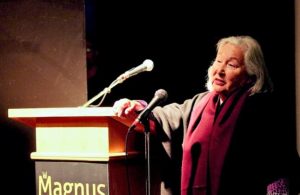Wiikwemkoong Elder recounts being on set of Indian Horse

By Rick Garrick
THUNDER BAY—Wiikwemkoong Elder Edna Manitowabi shared some of the details of her performance as Naomi, the grandmother, in the film Indian Horse during a Culture Days film screening in Thunder Bay.
“This [film] was really a great opportunity to tell our story, to tell the story of our people that was hidden for so long,” says Manitowabi, professor emeritus with Trent University’s Indigenous Studies program and fifth degree Midewewin teacher. “And now—finally—it is out in the open and long overdue.”
Manitowabi says it is difficult for First Nations people to tell their stories about residential school, but it is something they have to do.
“We have to tell our stories no matter what experiences we have gone through,” Manitowabi says. “If you don’t tell the stories of grief, of sadness, of sorrow, all of those strong emotions, they might fester inside and make us sick. For me, I knew I had to do something because I struggled with sadness all of my life, since I was six-years-old when I was taken.”
Manitowabi says the scene in the film when the young Saul Indian Horse’s hair was cut triggered memories of her own experience of having her hair cut in residential school.
“It was the severing — something very special was severed,” Manitowabi says. “What was it that was severed? I felt as though the ties that I had with my family were severed. The connection that I had with my loved ones was severed, the relationships. I felt as though I had been disconnected and displaced and dispossessed. A young child, vulnerable, innocent, that’s what I felt, and so those are memories that I carry and I try to work them out all my life, trying to find a way to fill the emptiness, the void, the scars that were delved into my psyche back then.”
Manitowabi says she used those images to portray her role in the film.
“I used my mother’s sound, her look, her tears, her wailing,” Manitowabi says, noting that her mother wailed when she was sent off to residential school because she was the youngest in the family. “When Stephen Campanelli [the director] asked me to wail, I wondered how am I going to do that. So I remembered my mother, her image, her wail, and I dug it out. I dug it out from the depth of me and I crawled out of that tent wailing. And then he said do it again. I don’t know how many times I had to do it, but I did it.”
Manitowabi says all of her brothers were hockey players, and when they finished residential school, they kept on playing in hockey tournaments.
“They would go off and my mom would be yelling at them: ‘Don’t be drinking!’,” Manitowabi says. “You won’t find your way back home if you get drunk. Leave that booze alone — it’s not ours.”
Manitowabi says the young Saul Indian Horse was played by Sladen Peltier, who is a hockey player in her community.
“The older boys weren’t hockey players at all, so they had to learn from him,” Manitowabi says. “[Peltier] and I never did any acting in the movies before. This was our first time, but the older Saul’s, Ajuawak [Kapashesit] and Forrest [Goodluck], were a little bit more professional. But I think Sladen did an awesome job.”
Indian Horse was screened during Culture Days as part of a series of free film screenings and artist talks on Sept. 29 at Magnus Theatre. Culture Days was held from Sept. 28-30.


